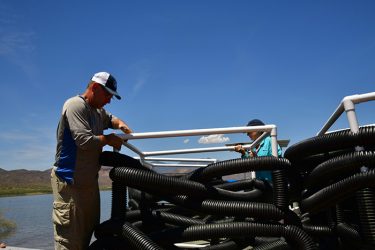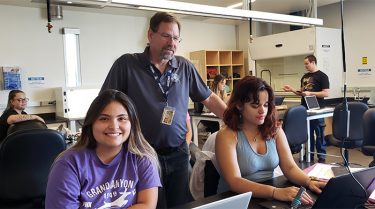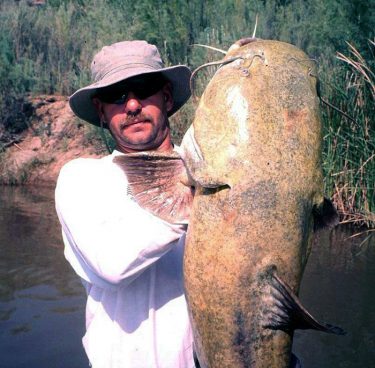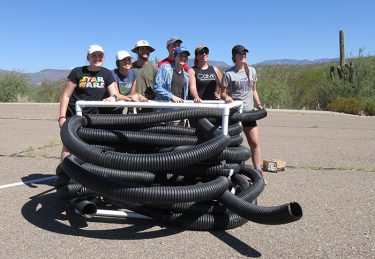
By Lana Sweeten-Shults
GCU News Bureau

Cocooned within four walls and clickety-clacking on a keyboard all day from the center of a cubicle farm lacked the romance David Weedman was looking for in a career. It just wasn’t the big fish story he was looking to tell.
“I changed my major every semester for three years,” he said of ping-ponging between geology, ecology and natural resource management majors before graduating from the University of Arizona in 1991 with, of all things, a bachelor of arts degree in liberal studies.
With that liberal studies degree in hand, one chock full of science coursework, he decided to be bold: “I was looking for a biology-type job,” he said, after digging deep and focusing on what he really loves – the outdoors – then walked into the Arizona Game and Fish Department office to volunteer.
That led to a job with the agency and the launch of a 28-year career with Game and Fish, where Weedman works as the Aquatic Habitat Program coordinator.
He brings all that knowledge and experience with him to Grand Canyon University’s College of Science, Engineering and Technology as its first Game and Fish liaison.

Weedman carves out a little space in a fourth-floor biology lab classroom (Room 445) in the Engineering Building every other Thursday, from 12:30-4:30 p.m. It's where he takes time to meet with and mentor students who might have questions about how they, too, might launch into a career in wildlife conservation.
GCU biology, ecology and environmental science instructor Adrienne Crawford, whose interests have included coral reef restoration and improving water conservation efforts along the Verde River, connected with Weedman about a year ago when she took a group of GCU students to the Roosevelt Reservoir to help Game and Fish build a fish habitat.
She asked Weedman to be a guest speaker in one of the University’s ecology classes. That’s when he mentioned the agency’s liaison program, which is in place at other universities around the state.
Soon after, Crawford met with the college’s assistant dean, Dr. Jon Valla, and Science Program Director Dr. Bina Vanmali to start the process of being assigned their own Game and Fish liaison.
Weedman didn’t hesitate to volunteer for the position.
“I don’t know how many people volunteered to be the liaison to GCU, but I was interested and was selected,” said Weedman, who has a previous connection to the University. His son Andrew, a theatre major who performed in many plays at Ethington Theatre, graduated from GCU in 2018.
Weedman is passionate about sharing his love of the outdoors and wildlife conservation – he grew up fishing and camping with his dad -- and with almost three decades of experience, he has a lot to share.

As the Aquatic Habitat Program coordinator, Weedman works to restore habitats in rivers, streams and reservoirs. He also puts together impact evaluations, looking at the potential effects of housing developments or new interstates, for example, on rivers, lakes and other bodies of water.
“We have a lot of reservoirs built around Phoenix and Arizona, and they’re all fairly old," he said. "With some of them, the water levels go up and down a lot over the years because of drought … and then we get a wet period and they’ll go back up. In that constant up-and-down cycle, it eliminates a lot of natural vegetative habitat on the lake bottom so you wind up with a lake bed that’s basically sterile.”
Biologists have turned to installing artificial fish habitat structures for fish to live around, feed and hide.
“If those structures weren’t there, these fish would just be randomly distributed around the lake. … By doing this, we can provide those locations to the structures on a map – to fishermen – and the fishermen can go and have better success in capturing fish.”
It was in August that Weedman, other Arizona Game and Fish biologists and conservation volunteers placed 70-100 plastic cubes – dubbed Georgia cubes because they were first developed by the Georgia Department of Natural Resources -- at Bartlett Lake. The cubes are fashioned from PVC pipe and corrugated drain pipes and serve as a “fish city” of sorts for the lake’s inhabitants.
He is hoping such conservation stories might spur students to not just love and appreciate the outdoors, if they don’t already, but also inspire them to choose a career in fish and wildlife conservation, perhaps even with Game and Fish.
“Our hope is to encourage folks to go into the wildlife management, wildlife biology or ecology fields so that we have a pool of potential employees moving forward in the future to help shape and guide Arizona’s wildlife conservation,” he said.
He also wants to enlighten students about all the possibilities out there for careers in the field.

Students, for example, might never have heard of wildlife law enforcement, whose game rangers investigate wildlife crimes and enforce wildlife protection laws. Those jobs require applicants who are willing to go through police academy training, he said, though, “We require our rangers to be biologists first.”
In addition to introducing students to possible degrees and careers in the field, Crawford said the presence of a liaison on campus such as Weedman is important in connecting students to relevant people in the field.
“That’s what these experiences are all about –- getting connections to volunteer opportunities and internships and talking to people in the field,” Crawford said, adding how two GCU students last year were chosen for Game and Fish internships. “Our goal also is to provide students opportunities to pursue field work.”
Weedman already has visited one-on-one with several students in the short time he’s been on campus, such as with one student who is interested in becoming a wildlife biologist specializing in herpetology. She wanted to know what courses she should take.
He sees the liaison position as part of a mutually beneficial relationship in which he can serve as a resource to the University's students and faculty while, at the same time, encouraging students to pursue a life of conservation, whether it's at Game and Fish or elsewhere.
“Whether they wind up working in the field or not, if they think about it a little bit more and understand about wildlife conservation and what it means to society ... they’ll have a little bit better understanding and support for it, and they will be more interested in conserving it."
Crawford, meanwhile, looks to the future of the University’s environmental science program, hoping to build off the ecology classes offered now.
Junior environmental science major Zenia Martinez already has visited with Weedman in the few weeks he’s been at GCU.
“He’s just a really big resource,” said Martinez, who would love to work for the Arizona Department of Environmental Quality. “He knows about job opportunities and internship opportunities, and quite frankly, he has told me about opportunities in the field I haven’t even thought about. He’s just a general guide on what my life can look like.”
GCU senior writer Lana Sweeten-Shults can be reached at [email protected] or at 602-639-7901.
****
Related content:
GCU Today: GCU steps up for black-footed ferret count
GCU Today: Trailblazers: The Story Behind GCU's First Environmental Studies Graduates



































































